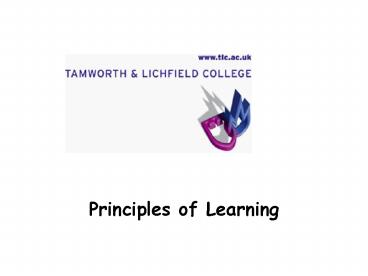Principles of Learning - PowerPoint PPT Presentation
1 / 14
Title:
Principles of Learning
Description:
Andragogy ... Andragogy: learning is based upon ... Movement beyond pedagogy, Andragogy to more holistic approach or self-determined, ... – PowerPoint PPT presentation
Number of Views:1413
Avg rating:3.0/5.0
Title: Principles of Learning
1
- Principles of Learning
2
Objectives
- Knowledge understanding of how principles
develop - Develop key principles associated with effective
teaching learning - Knowledge understanding of Pedagogic and
andragogic approaches to learning - Critically evaluate appropriate strategies
against the strength weaknesses of both
approaches
3
Principle
Principles are based upon perspectives/concepts
that we hold in valueprinciples are stances
that we take based upon concepts considered
importantas such, they can change Fawbert (2004)
4
Look at the two teaching contexts
- Identify main characteristics associated with
each context - Where would each approach be best suited?
- Identify potential weaknesses and limitations in
both situations
5
Pedagogy
Instructional based teaching (passing on of
knowledge) from teacher to pupil
Greek paid (means child) agogus (meaning
leader of)
Associated with passive learning, although
modern teaching at all levels does not strictly
conform with pedagogic structure as there is
elements of student interactivity
6
Pedagogic Learning based upon a content
plan/approach
- What content needs to be covered? (product based
curriculum) - How can the content be organized in manageable
chunks? - How can this content be transmitted in a logical
order? - What are the most effective methods for
transmission to take place successfully?
7
Andragogy
Empowering the learner to take control of their
own learning by facilitating and enabling them to
develop and enact own learning strategies against
a series of learning organized/negotiated by
themselves
Greek ancre (for adult) agogus (the art
science of helping students to learn)
8
Andragogy learning is based upon
Emphasis upon facilitation and enabling process
of learning (process based curriculum) Negotiated
learning in terms of learning management Student
centred/Tutor facilitation
9
Knowles, M. (1973) The Adult Learner A Neglected
Species Knowles, M. (1980) The Modern Practice of
Adult Education Andragogy Vs. Pedagogy
- Pedogogy had historical links to teacher directed
education - Based upon the assumption that students only
needed to know that which was determined by
others and had no relation to their own lives - Outcome of pedagogic teaching was students
personality is dependant rather than
self-directing - Subject centred curriculum
10
Adult learning (Knowles) Theoretical basis
Adults learn differently from children
Self-concept Adults need to be self-directing
they can express what they need from learning,
therefore they should be involved in the planning
process (negotiation)
Experience greater than a childs and is used as
a basis for knowledge as they engage in learning.
Also experiences teaches them that they do not
have to work in isolation but can learn from each
other
11
(Knowles)
Readiness to learn Most choose to learn because
it is perceived as relevant to them
(needs/desires) They perceive the immediate
importance of it
Orientation to learning An adults orientation
to learning is more life centred than subject
centred. They want to learn via problem solving
and apply learning to real life situations
12
Self-directed learning is. The process in which
individuals take the initiative, with or without
the help of others, in diagnosing their learning
needs, formulating learning goals, identifying
human and material resources for learning,
choosing and implementing learning strategies,
and evaluating learning outcomes. Knowles, M.
(1970)
13
Issues
Knowles acknowledges that some pedagogic
strategies are still required at times
(development of knowledge base)
Need to take into account cultural issues that
may lead adults to engage in self directed
learning but also for those adults that have
negative issues and stay away from learning
Still an element of tutor involvement in andragogy
Movement beyond pedagogy, Andragogy to more
holistic approach or self-determined, reflective,
action learning (knowing how to learn)
14
References
Fawbert, F. Et al (2003) Teaching in Post
Compulsory Education Knowles, M. (1973) The
Adult Learner A Neglected Species Knowles, M.
(1980) The Modern Practice of Adult
EducationAndragogy Vs Pedagogy McCoy, Beth.
(1999) Andragogy-The Theory of Learning
(http//mason.gmu.eduemco1/portfolio/masters
theory paper.htm) Petty, G (2000) Teaching
Today Reece, I. Walker, S. (2004) Teaching,
Training Learning Saunders, C. (2000) Pedagogy
Vs AndragogyAre We Treating Our Students Like
Children? (http//www-cgsc.army.mil/dad/pedagogy.h
tm) Tusting, K. Barton, D. (2003) Models of
Adult Learning A Literature Review www.nrdc.or
g.uk

